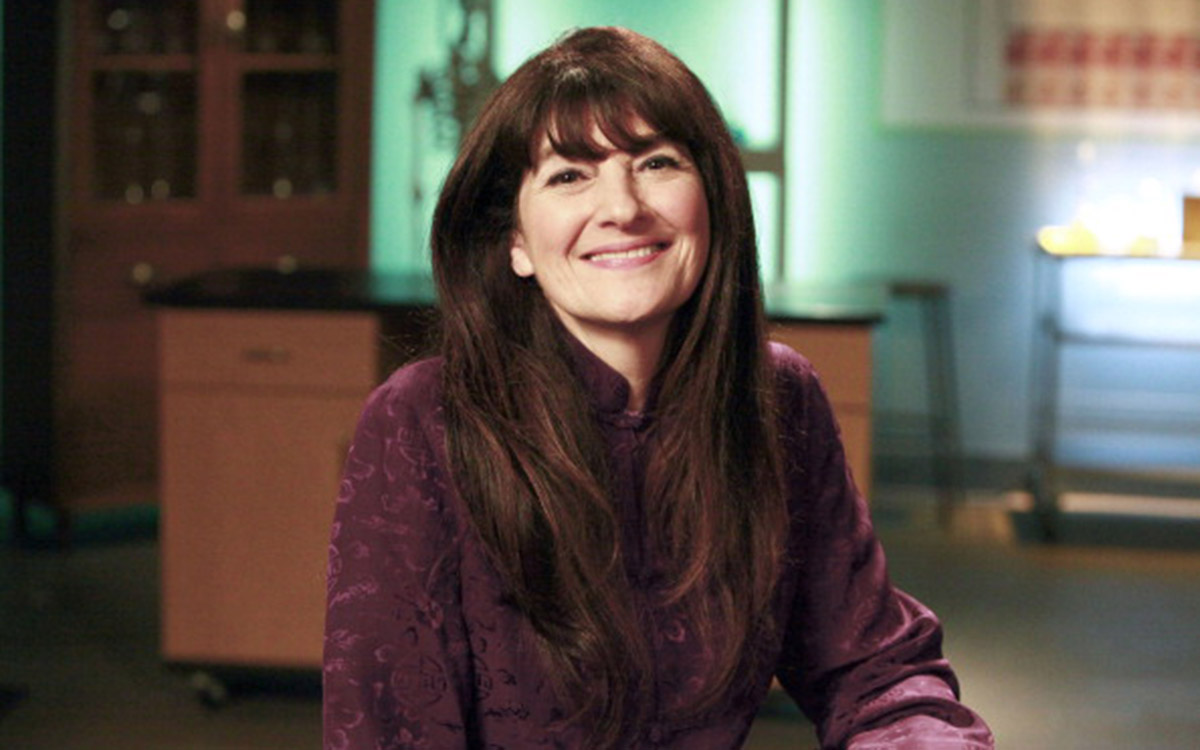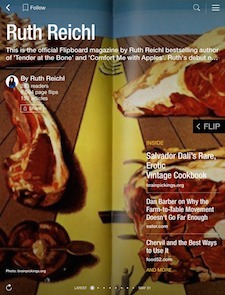On the Red Couch with Food Writer Ruth Reichl

Some wear many hats; Ruth Reichl preferred wigs. That’s because, as the food critic for The New York Times from 1993 to 1999, Reichl discovered that her headshot was placed in restaurant kitchens throughout the country. Chefs would scan dining rooms for an effusive woman with flowing, dark hair who could make or break their careers—so review after review, the writer donned a new ‘do.
Few had reason to fear. Reichl (pronounced RYE-shil) used her pedestals—both at the Times and as Editor-in-Chief of the now-defunct Gourmet Magazine—to champion the best in food. But if something went south, as did almost everything during an amusingly dysfunctional visit to Manhattan’s Box Tree, her blade was swift: “Best of all, it is almost time to leave,” she remarked at the sight of dessert.
Less a food snob than a free spirit, Reichl came to California in the early ’70s to live in a commune and cook at a co-op before transitioning into an editor, critic and memoirist. With the publication of Delicious! last month, she’s fulfilled a long-standing dream of becoming a novelist. We spoke with her about seeing the world “food-first,” male egos, and what you should—and shouldn’t share—at the dinner table.
We live in a time in which everyone’s a food critic. Why is a professional restaurant critic still relevant?
Good criticism enriches your experience—whether it’s film, books, TV, theater. Restaurant criticism works in the same way. One of the things that’s been great about social media is that it’s taken on the consumer reporting aspect, leaving the professional critics to do something more important: to put things in context and give you the history and a better way to experience restaurants.
Was there a memorable meal that made you think, “I want to write about these things for the rest of my life”?
No. (Laughs) Truth be told, when I was first offered the chance to be a restaurant critic, my first thought wasn’t, “Oh, this is a new profession for me.” My first thought was “free meals!”
Professional cooking has become a macho endeavor. You can turn on the TV and see any number of male chefs taking up the screen. Isn’t that removed from the more traditional homestyle scenes that are familiar to many of us?
Well, what’s wrong about that is equating home cooking with restaurant cooking. A more interesting comparison would be between restaurant cooking and factory work. It’s an assembly line. A chef isn’t really a cook; a chef is the CEO of a company. Being a chef is about getting people to translate your vision.
That said, I do think that we are seeing women chefs coming up, and they are just very different from their male counterparts. A lot of them are choosing not to be in charge. Men do it more for ego, and women do it for a lot of other reasons.
Eating is a touchy subject: if you love spicy food, going on a date with someone that doesn’t can be a deal breaker. Does learning about our appetites give us a better understanding of ourselves and other people?
I do see the world “food-first” and I’ve always categorized people by what they ate. Our food choices are very much like handwriting. They are one of the ways we tell the world who we are. It’s not for nothing that there are kosher and halal laws, and part of those is to set people apart by saying, “This is who I am.” It’s a way of announcing yourself to the world.
When someone says, “I love spicy food,” they’re essentially saying, “I’m an adventurous person.” Someone who grows up in a kosher home who chooses not to keep kosher, that’s a huge statement. You can be with someone who likes a different kind of movie, but you’re going to be eating a lot together—so of course you’re gonna care what they eat!
Has social media affected those statements? Is there something interesting about taking pictures of our food, or is it a class signifier?
When I was 25 and had no money, I didn’t go out to eat. It didn’t occur to me as a way I could spend money. My son is 25 and has no money and it wouldn’t occur to him not to go out to eat. It’s just one of the things he needs to do. I don’t think it’s so much [about] class unless you’re talking about very rich or very poor people.
I hope we get beyond taking pictures of our food. I do it myself, but it’s pretty tiresome to be with someone who’s pushing the silverware out of the way so they can get the right angle of their food. It’s annoying the way photography has taken over the experience. I hate it when people are taking pictures of things while traveling and they’re so busy taking photos, they’re not even there. We’ve gotten to that point with food.
Food has achieved a near-mythic significance in America. Why?
Food TV. I’m sorry to say it, but you cannot underestimate the importance of having a generation of kids who may not have seen their mom’s cooking, but who loved watching Mario Batali, and who are now in their twenties. They saw chefs as celebrities, as interesting people in the culture, and so they experienced food in a way that no previous generation ever did.
There’s a line in your book “Tender at the Bone”—“Even in the dark I could hear the smile in her voice”—that sums up your writing in way. It helps us receive an intimate, sensory sensation, if not the tangible product. It’s personal. Have you felt reluctant to tell stories from your private life?
Not from my own life. I’ve had real pause about incorporating my family. I’ve been very cautious on what I’ve written about my son. I think your parents are fair game, but your kids aren’t. In my memoirs, if I’ve worried that I was treading on people’s privacy, I sent them that part of the book and asked if they had any objections. I don’t have a big sense of privacy. But I know other people do, and I’m very cautious about saying things about other people that they might have problems with.
In terms of process, was writing a novel that different from writing food? Were you channeling the same ability?
No, it’s really different. As a daily journalist, once you’ve gathered the facts, you decide what angle you’re going to take and you know where you’re going. With fiction, you’re inventing it all and because of that, it goes in places you don’t expect. When you let yourself go, the characters take over. The next day you have to decide whether you’re going to let that happen.
My characters continually surprised me and there was a kind of “letting go” that’s very different from non-fiction. You have to come back with all your mind and read it and say, “Am I gonna let Sammy be that person? It’s not who I thought…” and you have to decide, “Yeah, I love him. He’s not who I thought he was, but I love him.”
It’s both harder and more fun because anything can happen.
You’ve adapted to change really well. When you were running Gourmet, did you ever wonder what life would look like beyond the plate, so to speak?
I loved my job at Gourmet but I never thought that I was there forever. One of the things about running that kind of magazine was to take chances. You have to be constantly aware that you could get fired. I wrote books the whole time I was there because I thought the minute that they think that they own me, I’m in trouble. I’d have fights with my publishers about publishing the David Foster Wallace piece, and I would say, “No, I’m going to do it.” I always felt like I just need them to know that I have another life, that I can write books, and I’m not going to stop doing that. I need them to know that I’m just a visitor to this world.
Talking about disparate things makes for great criticism. Within the essayistic tradition, it’s a handy way to spot links in the cultural chain. That tradition lives on in writing about sports or pop culture or music. Has that way of thinking about food—beyond food—faded away?
When there was no longer a Gourmet, I wished that another mainstream publication would have tried to do what we did: which was to talk about culture and politics and anthropology and all of that in a mainstream publication. Unfortunately what we’re getting—Lucky Peach or Cherry Bombe or Modern Farmer, which are all great—are niche publications for a smaller audience. It makes me sad. I still think there’s a place in the world for a mainstream epicurean publication that’s challenging.
Besides including great recipes, how can a food magazine—whether in print or online—entice readers?
What we tried to do at Gourmet was create a magazine that didn’t give people what they expected, but what they didn’t know they wanted. It had an element of surprise. One of my goals was for every issue to have something in it that caused people to go, “Isn’t that amazing? What a great piece of writing!” or “I didn’t know that I wanted to know that, but I’m really glad I do now.” If you go beyond the expected and give people an appetite, they will keep coming back.
You’ve said that you could live in a house without furniture, or go without new clothes, but that you couldn’t live without literature. If you could invite any writer(s)—living or dead—who would you choose, and why?
Grace Paley was a wonderful writer and activist and someone who felt very familiar to me. George Saunders, I’m so admiring of him, he seems like a guy with such an amazing vision and so kind. And you’d want to have Shakespeare at your table—wouldn’t you? Even just to know who he was! He would have to be fabulous company. I love Hilary Mantel and would love to get her together with a writer named Dorothy Dunnet, both of whom are big writers of historical fiction with interesting lives.
How would you counsel a young person who’s prone to eating out constantly to think about food in a way that was essential to your culinary education?
I wish people would cook more. Cooking is so easy and fun. People say they don’t have time, but if you figure out what you’re gonna cook for a week and do the shopping, the work is mostly done.
There’s so much good, simple food. It worries me that we spend so much of our private time in public spaces. I wish people would invite people into their homes, which is an act of bravery. They get to see you with all your warts, with your animals misbehaving and your cats walking on the counters.
That’s how you foster intimacy. There’s a distance that happens when you just meet in restaurants. Learn to cook a few things, invite people over, and share your home and table.
It’s no secret that Ruth has excellent taste. Check out her collection of the latest cuisine, recipes, and musings on food culture here on Flipboard:
~ShonaS is curating “Holiday Road (6/27)”
/flipboard
@flipboard
+flipboard


